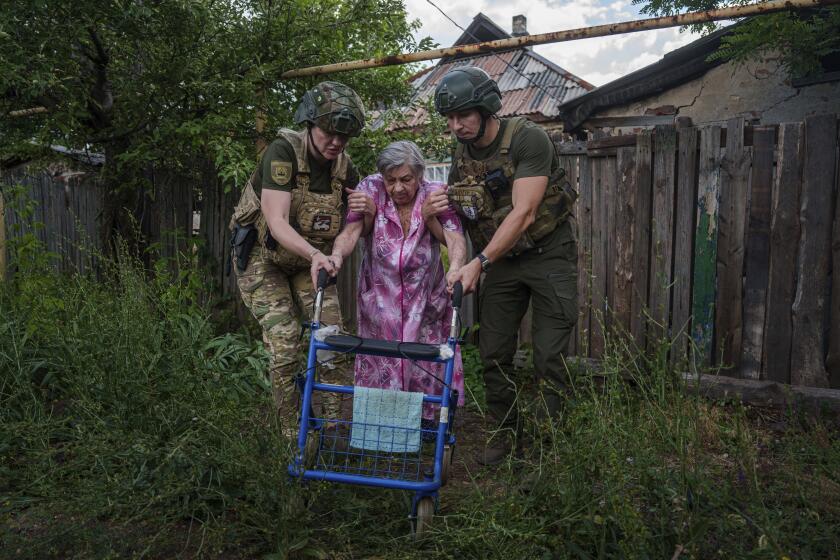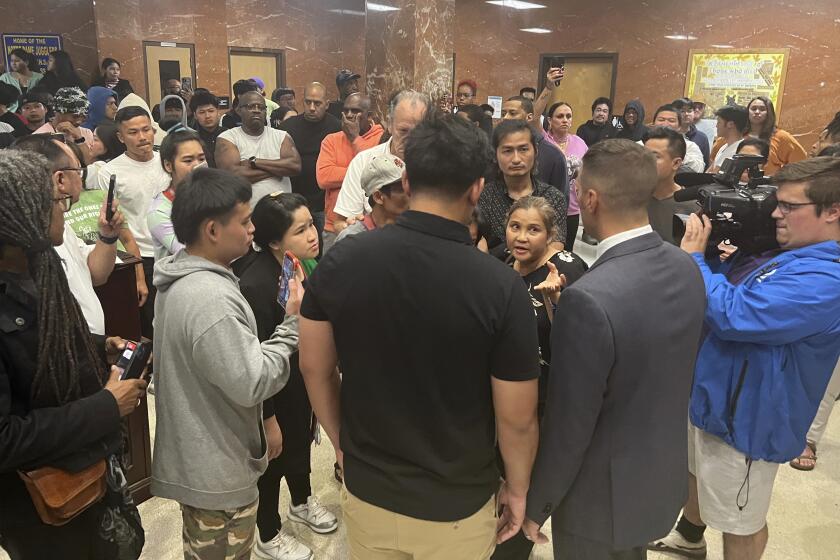U.S. Protests Taiwan’s Arrest of Publisher
Efforts to free the publisher of a Monterey Park-based Chinese-language newspaper who was arrested in Taiwan this week sharply intensified Thursday with U.S. officials in Washington protesting the arrest and warning that it could threaten American arms sales to Taiwan.
Rep. Stephen J. Solarz (D-N.Y.), chairman of the House Foreign Affairs Committee’s subcommittee on Asian and Pacific affairs, called Taiwan’s arrest of Lee Ya-ping, 62, “an act of profound disrespect for the people and laws of the United States that calls into serious question the eligibility of Taiwan for future arms sales from our country.”
The U.S. State Department, in a statement prepared for response to reporters’ inquiries, said: “Arresting a U.S. newspaper publisher for her professional activities in the United States must be seen as an act of intimidation and harassment directed against individuals in the United States. We are asking the Taiwan authorities to review the case immediately and to release Miss Lee without further delay.”
And two Southern California congressmen, Democrats Mervyn M. Dymally and Mel Levine, also registered protests and called for Lee’s immediate release.
Lee, a Taiwan citizen with immigrant status in the United States who lives in San Marino, was arrested for allegedly publishing articles supporting Peking’s overtures for reunification of Taiwan with China. She was specifically charged with having “repeatedly advocated that Taiwan should hold peace talks and carry out commercial, postal and travel relations” with China, and with having promoted “communist psychological warfare” by publishing a 1982 interview with Chai Zemin, who at the time was China’s ambassador to the United States.
Faces Possible Death Penalty
Taiwan authorities have said Lee’s publishing activities violate an article of the Anti-Sedition Act forbidding the spread of propaganda that benefits rebels. She faces a possible death penalty.
Her paper, the International Daily News, has a daily circulation of 58,000 throughout the United States, according to her son, Simon Chen, general manager of the publication. Taiwan authorities charged that copies of the newspaper were found circulating in Taiwan despite a ban imposed on it by the government.
The State Department’s description of the incident as “an act of intimidation and harassment” echoed language in a 1982 U.S. law sponsored by Solarz that forbids American arms sales to countries that engage in a “consistent pattern” of “intimidation and harassment” against people in the United States.
A State Department official, who spoke on condition that he not be identified, said the department’s comment was “intended to be an extremely strong statement.”
“If you’ve noticed a correlation between some of the language of Mr. Solarz (in the 1982 law) and the statement,” he said, “so be it.”
The 1982 law, an amendment to the Arms Export Control Act, was written by Solarz after the death of Chen Wen-cheng, a Chinese-American professor, during a trip to Taiwan in 1981. Chen died after being questioned by government agents, and critics of Taiwan’s government have charged that he was beaten to death by security personnel.
Solarz said Thursday that both Lee’s arrest and last year’s murder in Daly City of Chinese-American journalist Henry Liu are “frightening examples of the long arm of Taiwan martial law tearing at the fabric of American democracy.”
Taiwan courts convicted two Taiwan gangsters of carrying out the murder of Liu, who had written critically of Taiwan’s government. Wang Hsi-ling, Taiwan’s military intelligence chief, was convicted of instigating Liu’s murder.
“The authorities on Taiwan are not content to destroy basic liberties on the island of Taiwan, but insist on violating the right to free speech of people in the United States as well,” Solarz told The Times in a telephone interview from Washington. “The Kuomintang (the ruling Nationalist Party) needs to be reminded that the state of California is not a province of Taiwan.”
Solarz said he intends to introduce a resolution in Congress today “that would call on Taiwan to release Lee Ya-ping immediately, facilitate her return to the United States, and renounce jurisdiction over Taiwanese citizens for their acts in the United States that are protected under our Constitution.”
Solarz said he is also calling upon President Reagan to protest the incident by closing one of the regional offices of the Coordination Council for North American Affairs, Taiwan’s quasi-official diplomatic arm in the United States.
Solarz said he has reached the conclusion that there appears to be a pattern of harassment and intimidation against individuals in the United States that requires action by the Administration to cut off arms sales to Taiwan. But he added that such sales are so important to Taiwan that he believes its government, in the face of such steps, would stop such activities and offer whatever guarantees are needed to prevent a permanent cutoff of arms sales.
Met With Taiwan Official
Dymally also met with a Taiwan official in Washington on Thursday to express deep concern over Lee’s arrest, according to Miya Iwataki, his press secretary.
Levine said Thursday that he has sent telegrams to Taiwanese President Chiang Ching-kuo and Premier Yu Kuo-hwa seeking assurances of Lee’s safety and urging her immediate release.
Prisoner Transfer
Anthony Yuen, editor-in-chief of Lee’s paper, said late Thursday afternoon that he had received word that Lee had been transferred from the southern city of Kaohsiung, where she was arrested, to the Taiwan Garrison Command headquarters in Taipei.
“The Garrison Command only gives us a post box number--they say if we have anything we want to communicate with her, just use this post box,” Yuen said. “We cannot have our representative see her personally.”
Victor Chang, deputy director of the information and communication division of the Los Angeles office of the Coordination Council for North American Affairs, said Thursday afternoon that “both our Washington office and my office will have to wait for official reaction from Taipei” before responding to the statements by Solarz and the State Department.
Chang stressed, in response to news reports that Lee could face execution, that under the anti-rebellion statute she is accused of violating, “there are different degrees of punishment, and whatever charges reflect on her right now do not include the possibility of the death penalty.”
More to Read
Start your day right
Sign up for Essential California for news, features and recommendations from the L.A. Times and beyond in your inbox six days a week.
You may occasionally receive promotional content from the Los Angeles Times.






